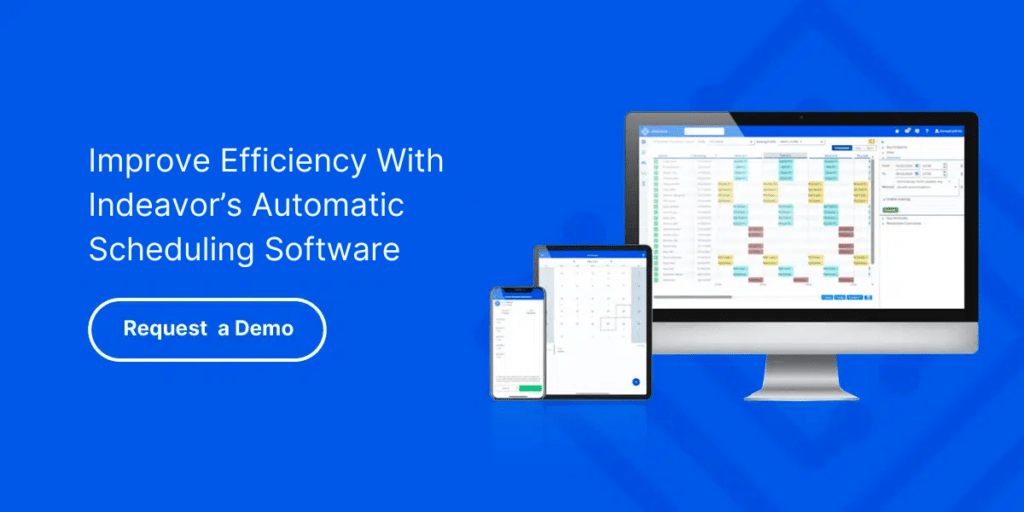There are several reasons large enterprises need a centralized cloud workforce management software. Large-scale organizations face increasingly complex challenges in managing a diverse and dispersed workforce due to the vast geographic spread and varied operational needs of their facilities. From aligning employee schedules with fluctuating market demands to ensuring compliance across multiple locations, each facility requires nuanced strategies to handle different legal and market conditions effectively.
Many of these challenges stem from outdated or fragmented systems that struggle to provide the flexibility and scalability necessary for modern operations.
Enter cloud Workforce Management Software. These systems offer a streamlined, integrated approach, ensuring that workforce management can scale seamlessly with the growth of the enterprise. By adopting a unified cloud Workforce Management solution, enterprises can enhance operational efficiency, improve data-driven decision-making, and maintain a competitive edge in the global market.
Why Enterprises Need One SaaS Solution for Workforce Management
Strategic Alignment
Aligning With Business Objectives at Scale
A unified cloud Workforce Management Software serves as a backbone for enterprises looking to boost operational efficiency and scalability. This system simplifies the complex task of managing labor costs and workforce productivity across multiple geographic locations. By centralizing workforce management, enterprises can rapidly adapt and scale their operations up or down in response to market demands or internal changes without the lag or disruption often associated with non-integrated systems.
Scalability is not just about handling more users or more data; it’s about enabling enterprise growth without proportional increases in overhead or declines in user experience. The right cloud solution can dynamically allocate resources, adjust to varying load demands, and support expansion into new markets with ease, making it an essential tool for global enterprises aiming for growth in a fluid market environment.
Consistency Across Operations
Consistency in workforce management is crucial for enterprises, especially those operating on a global scale with potentially hundreds of locations. Disparate systems lead to a patchwork of policies, work rules, and software platforms that can create significant operational inefficiencies and compliance risks. A comprehensive cloud Workforce Management Software solution ensures that the same high standards are maintained across all locations, simplifying training, compliance, and management.
By standardizing processes and data analytics, a unified system reduces variances that negatively impact productivity and profitability. This standardization helps identify performance outliers and operational inefficiencies quickly, allowing for swift corrective action. It also ensures a more predictable and manageable operational environment, where strategic decisions are based on reliable data from a consistent framework.

Centralization of Data
Single Source of Truth
Centralizing workforce data within one system is crucial for large enterprises. It eliminates discrepancies and inconsistencies that typically arise from using multiple data sources. With a single repository for all workforce-related information, enterprises can ensure that every decision made is based on accurate and up-to-date data.
This centralization is not only pivotal for real-time reporting but also enhances the reliability of forecasts and strategic planning. Having a single source of truth allows leadership to make informed decisions that anticipate future needs rather than merely reacting to present challenges.
Data Integrity and Security
A cloud Workforce Management solution significantly streamlines the handling of data, reducing the risk of errors and data breaches that can occur when multiple systems are in use. By consolidating data into one platform, enterprises reduce these points of weakness, enhancing overall data security.
A comprehensive system can implement uniform security measures across all data, ensuring compliance with data protection regulations and reducing the risk of costly legal issues. For example, union grievances related to employee scheduling may result in fines. It also simplifies the process of updating security protocols, as changes need to be implemented only once across the entire platform, rather than individually across disparate systems.
Ease of Integration
Interoperability With Other Systems
Enterprises are most likely relying on a variety of tools and platforms, some of which may be siloed. Cloud Workforce Management Software is designed with flexibility and interoperability at its core. This allows for seamless integration with the essential business management tools you’re already using, such as Human Resources Information Systems (HRIS), Enterprise Resource Planning (ERP) systems, and Customer Relationship Management (CRM) software.
By interfacing directly with these systems, a cloud Workforce Management solution can automate data flows, synchronize updates across platforms, and eliminate the need for manual data entry. This integration ensures that information such as employee details, payroll data, and work hours are consistently aligned across all departments, enhancing accuracy and speeding up business processes.
APIs and Extensibility
Application Programming Interfaces (APIs) are pivotal for modern SaaS platforms, enabling them to offer a high degree of customization and flexibility. These APIs allow businesses to tailor the Workforce Management Software to their specific operational needs, whether that involves customizing dashboards, generating unique reports, or integrating with niche tools specific to their industry.
The extensibility through APIs means that as the enterprise grows or changes, the system can adapt quickly by adding new functionalities or updating existing ones—without disrupting the overall system functionality. This adaptability is crucial for maintaining an edge in a competitive market where business needs can change rapidly.
Closing Thoughts
For enterprises to scale effectively, adopting a centralized cloud Workforce Management Software solution is no longer optional—it’s essential. This type of software allows organizations to consistently align operations with business needs, maintain a secure and unified source of truth for workforce data, and integrate seamlessly with existing systems.
Moreover, cloud Workforce Management Software offers the agility needed in today’s rapidly evolving marketplace. It not only supports real-time decision-making but also provides the flexibility to adapt to changing market conditions, regulations, and workforce demands. By ensuring operational consistency across multiple locations, streamlining compliance, and improving data accuracy, enterprises can mitigate risks and enhance both employee satisfaction and organizational productivity.
In the end, choosing a robust cloud Workforce Management Software positions enterprises for long-term success by empowering them with the tools needed to optimize their workforce, drive efficiency, and stay ahead in a competitive global market.







